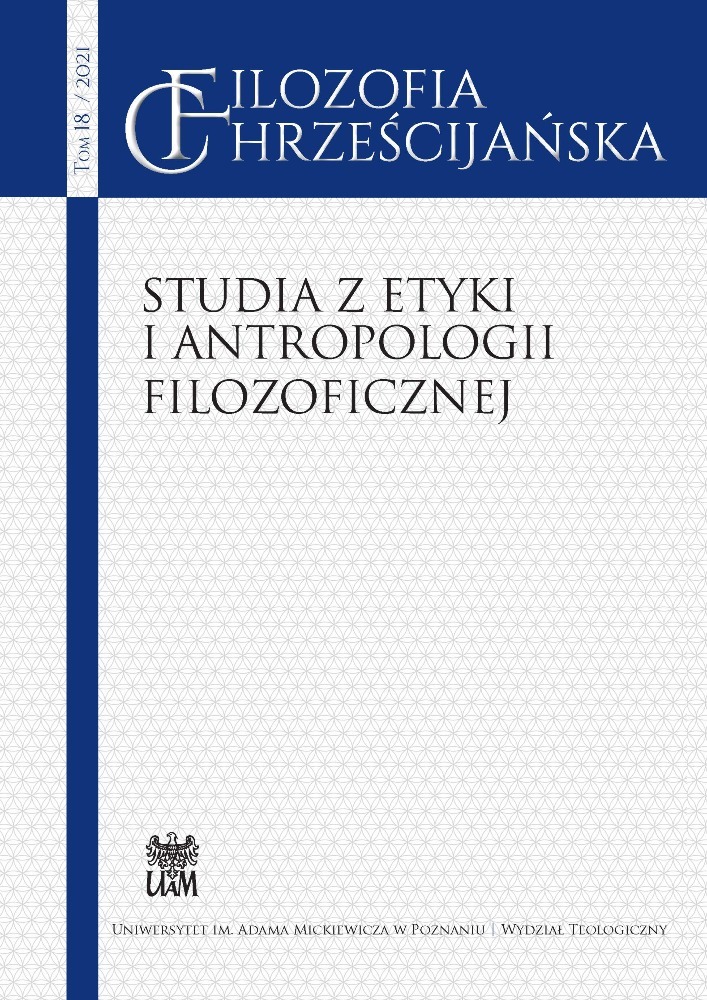Abstract
The article presents a proposal of solution of the problem of moral luck in the context of the principle of control. This principle states that the condition for assigning responsibility, moral guilt / merit is to have control over the action by the perpetrator. According to his supporters, a moral hit causes the moral evaluation of a subject's action that was disturbed by chance or a factor beyond the subject's control. The article tries to show that there is no complete lack of control in the actions that are affected by chance. Hence, one cannot put forward such distant consequences of the impact of luck on morality as the negation of the rationality of assigning moral responsibility and blame / merit in general. Instead, the article proposes to assign moral responsibility separately from guilt / merit, depending on the intention of the acting subject.
References
Adams R.M., Involuntary Sins, „The Philosophical Review” 94 (1985), s. 3 -31.
Andre J., Nagel, Williams, and Moral Luck, w: Moral Luck, red. D. Statman, New York 1993, s. 123 -129.
Filek J., Filozofi a odpowiedzialności XX wieku, Kraków 2003.
Foley R., Epistemic Luck and the Purely Epistemic, „American Philosophical Quarterly” 21 (1988), s. 87 -97.
Handbook of implicit social cognition: Measurement, theory, and applications, red. B. Payne, B. Gawronski, New York 2010.
Jensen H., Morality and Luck, w: D. Statman, Moral Luck, New York 1993, s. 131 -140.
Kirkwood K.W., Of Luck Both Epistemic and Moral in Questions of Doping and Non-Doping, „Ethic in Progress” 11 (2020), nr 1, s. 77 -84.
Krajewska A., Problem odpowiedzialności za przypadkowe skutki działań, „Roczniki Filozoficzne” LXVII (2019), nr 2, s. 119 -140.
Moral Luck, red. D. Statman, New York 1993.
Nagel T., Traf w życiu moralnym, w: T. Nagel, Pytania ostateczne, tłum. A. Romaniuk, Warszawa 1997, s. 37 -53.
Nelkin D.K., Moral Luck, http://plato.stanford.edu/archives/win2013/entries/moral-luck/ [dostęp: 23.02.2016].
Ossowska M., Podstawy nauki o moralności, Wrocław–Warszawa–Kraków 1994.
Otsuka M., Moral Luck: Optional, Not Brute, „Philosophical Perspectives” 23 (2009), s. 373 -388.
Payne B., Gawronski B., A history of implicit social cognition: Where is it coming from? Where is it now? Where is it going?, w: Handbook of implicit social cognition: Measurement, theory, and applications, red. B. Gawronski, B. Payne, New York 2010, s. 1 -18.
Ravitch H., Knowledge and the Principle of Luck, „Philosophical Studies” 30 (1976), s. 347 -349.
Rescher N., Moral Luck, w: Moral Luck, red. D. Statman, New York 1993, s. 141 -166.
Richards N., Luck and Desert, w: Moral Luck, red. D. Statman, New York 1993, s. 167 -180.
Schinkel A., The Problem of Moral Luck: An Argument Against its Epistemic Reduction, „Ethic Theory and moral Practice” 2009, nr 12, s. 267 -277.
Statman D., Introduction…, w: Moral Luck, red. D. Statman, New York 1993, s. 1 -34.
Strzyżyński P., Kilka uwag na marginesie sporu między Gregorym S. Kavką a Williamem Neblettem o poczucie winy, „Ruch Filozoficzny” 72 (2016), nr 2, s. 63 -76.
Strzyżyński P., Wybrane konsekwencje trafu moralnego dla etyki, koncepcji społecznych i religijnych, „Teologia i Moralność” 26 (2019), s. 211 -233.
Sverdlik S., Crime and Moral Luck, w: Moral Luck, red. D. Statman, New York 1993, s. 181 -194.
Tomasz z Akwinu, Suma teologiczna, tłum. F.W. Bednarski, t. 18, Londyn 1970.
Weischedel W., Das Wesen der Verantwortung, Frankfurt am Main 19723.
Williams B., Traf moralny, w: B. Williams, Ile wolności powinna mieć wola?, tłum. T. Baszniak, T. Duliński, M. Szczubiałka, Warszawa 1999, s. 215 -238.
Wolf S., The Moral of Moral Luck, „Philosophic Exchange” 31 (2001), s. 4 -19.
Zimmerman M.J., Luck and Moral Responsibility, w: Moral Luck, red. D. Statman, New York 1993, s. 217 -233.
Zipursky B.C., Two dimensions of responsibility in crime, tort, and moral luck. „Theoretical Inquiries in Law” 9 (1), 2008, s. 97 -137.
License
Copyright (c) 2021 PRZEMYSŁAW STRZYŻYŃSKI

This work is licensed under a Creative Commons Attribution-NoDerivatives 4.0 International License.
Autorzy
Autorzy tekstów przyjętych do publikacji w czasopiśmie Filozofia Chrześcijańska są zobowiązani do wypełnienia, podpisania i odesłania na adres redakcji umowy o udzielenie nieodpłatnej licencji do utworów, z zobowiązaniem do udzielania sublicencji CC.
Zgodnie z umową, autorzy tekstów opublikowanych w czasopiśmie Filozofia Chrześcijańska udzielają Uniwersytetowi im. Adama Mickiewicza w Poznaniu niewyłącznej i nieodpłatnej licencji oraz zezwalą na użycie sublicencji Creative Commons Attribution-NoDerivatives 4.0 International (CC BY-ND 4.0).
Autorzy zachowują prawa do dalszego, swobodnego rozporządzania utworem.
Użytkownicy
Zainteresowani użytkownicy internetu uprawnieni są do korzystania z utworów opublikowanych od 2015 roku w Filozofia Chrześcijańska pod następującymi warunkami:
- uznanie autorstwa - obowiązek podania wraz z rozpowszechnionym utworem, informacji, o autorstwie, tytule, źródle (odnośniki do oryginalnego utworu, DOI) oraz samej licencji;
- bez tworzenia utworów zależnych - utwór musi być zachowany w oryginalnej postaci, nie można bez zgody twórcy rozpowszechniać np. tłumaczeń, opracowań.
Do wszystkich tekstów opublikowanych przed 2015 r. prawa autorskie są zastrzeżone.
Inne
Uniwersytet im. Adama Mickiewicza w Poznaniu zachowuje prawo do czasopisma jako całości (układ, forma graficzna, tytuł, projekt okładki, logo itp.).
